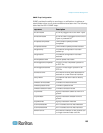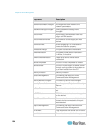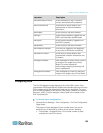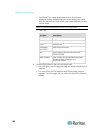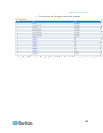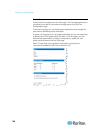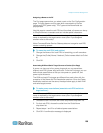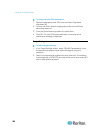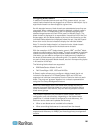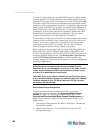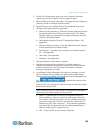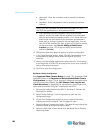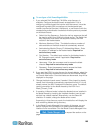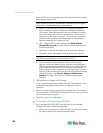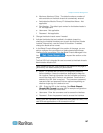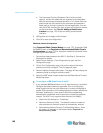
Chapter 8: Device Management
161
Configuring Blade Chassis
In addition to standard servers and rack PDUs (power strips), you can
control blade chassis that are plugged into a Dominion device port. Up to
eight blade chassis can be managed at a given time.
As with standard servers, blade chassis are autodetected once they are
connected. When a blade server chassis is detected, a default name is
assigned to it and it is displayed on the Port Access page along with
standard target servers and rack PDUs (see Port Access Page). The
blade chassis is displayed in an expandable, hierarchical list on the Port
Access page, with the blade chassis at the root of the hierarchy and the
individual blades labeled and displayed below the root. Use the Expand
Arrow icon next to the root chassis to display the individual blades.
Note: To view the blade chassis in a hierarchal order, blade-chassis
subtypes must be configured for the blade server chassis.
With the exception of HP
®
blade chassis, generic, IBM
®
, and Dell
®
blade
chassis are configured on the Port page. The port connected to the blade
chassis must be configured with the blade chassis model. The specific
information you are able to configure for a blade server will depend on
the brand of blade server you are working with. For specific information
on each of these supported blade chassis, see their corresponding topics
in this section of the help.
The following blade chassis are supported:
IBM BladeCenter
®
Models E and H
Dell PowerEdge
®
1855, 1955 and M1000e
A Generic option allows you to configure a blade chassis that is not
included in the above list. HP BladeSystem c3000 and c7000 are
supported via individual connections from the Dominion device to each
blade. The ports are 'grouped' together into a chassis representation
using the Port Group Management feature.
Note: Dell PowerEdge 1855/1955 blades also provide the ability to
connect from each individual blade to a port on the Dominion device.
When connected in that manner, they can also be grouped to create
blade server groups.
Two modes of operation are provided for blade chassis: manual
configuration and auto-discovery, depending on the blade chassis
capabilities. If a blade chassis is configured for auto-discovery, the
Dominion device tracks and updates the following:
When a new blade server is added to the chassis.
When an existing blade server is removed from the chassis.
Note: In the case of IBM Blade Center Models E and H, the KSX II only
supports auto-discovery for AMM[1] as the acting primary management
module.



